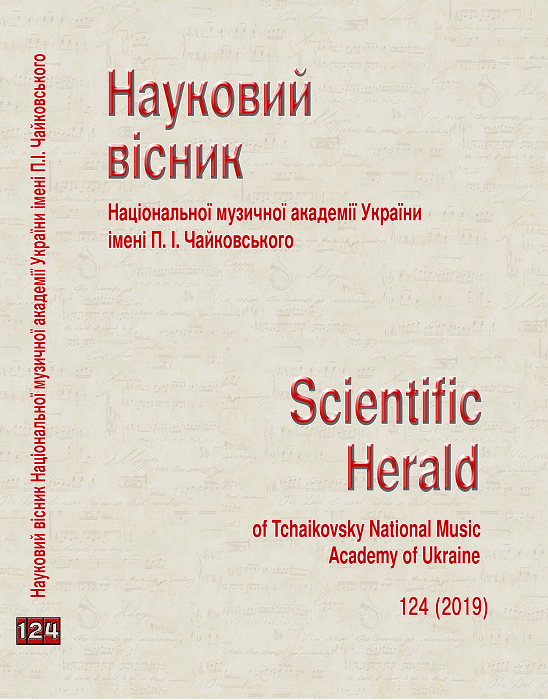Phenomenon of the Game in Modern Music Works
DOI:
https://doi.org/10.31318/2522-4190.2019.124.165401Keywords:
game, games, play, competitiveness, rules, computer game, level of complexity, participant, performerAbstract
The relevance of the article is the need to investigate the phenomenon of the game as a form of activity, consider the types of games and game strategies and determine their place in the musical and creative activity of a person. Also identify and substantiate the hypothesis of the emergence of new types of mimicry games in music practice, music and computer nature in particular.
Main objectives of the article are to describe and analyse the features of various types of games, to present their classification, and also to state and comprehend ways of using game forms of activity, strategies, the principle of competition and different types of games in music.
The methodology involves the use of descriptive and comparative methods to describe the modern concepts of defining and classifying games and comparing various types of gaming and musical activities. The method of cross-disciplinary analysis was also used to identify relation between various types of games, including music. The method of summarizing the selected data was also used to group the facts of attracting game strategies to musical activity. The complex use of these methods allowed us to explore ways of composing works according to game models, as well as attempts to imitate music in computer and other games, to identify the game organization of time and space in such compositions and ways to create musical analogues of games.
Results and conclusions. The article clarified and investigated the phenomenon of the game as a form of activity and gave a typology of games and game strategies. The features of various types of games are described and analysed, their classification is given. The ways of using game forms of activity, strategies, the principle of competition and various types of games in music have been analysed, as a result of which the deep connections between game forms of activity and the algorithms of musical creativity used by modern composers have been clarified. Theoretically, the conclusions are confirmed by a number of examples of composers creating essays for game models and game ways of organizing time and space. For the first time, successful examples of imitation in modern music of the principles of computer games and the creation of their musical analogues are thoroughly reviewed and analysed. A hypothesis about the possibility and fruitfulness of further successful research into development of algorithms and principles of computer games in the composer's creativity of the present has been put forward.
Downloads
References
Benesh, Helmut (2007). Psychology [Psykholohiia]. Kyiv: Znannia–Pres, 510 p. [in Ukrainian].
Bern, Eric (2016). Games in which people play [Ihry, u yaki hraiut liudy]. Kharkiv: Knyzhkovyi klub «Klub Simeinoho Dozvillia», 256 p. [in Ukrainian].
Blinov, A. L. (1983). Semantics and game theory [Semantika i teorija igr]. Novosibirsk: Nauka. Sibirskoe otdelenie, 130 p. [in Russian].
Goldmen, D. (2003). Healing sounds [Celitel’nye zvuki]. Moscow: Izdatel’skij dom «Sofija», 224 p. [in Russian].
Kajua, R. (2007). Games and Рeople [Igry i ljudi]. [Igry i ljudi. Stat’i i jesse po sociologii kul’tury]. Moscow: OGI, рp. 33–204. [in Russian].
Pereverzeva, Marina (2013). Music games of the twentieth century [Muzykal’nye igry XX veka]. Israel XXI [Izrail’ XXI], vol. 38 [online]. Available at: https://web.archive.org/web/20160805172833/http://21israel-music.com/Igra_XX.htm (Accessed 16 Sept. 2018) [in Russian].
Hjojzinga, J. (1992). Homo ludens. Homo ludens. In the shadow of tomorrow [Homo ludens. V teni zavtrashnego dnja]. Moscow: Izdatel’skaja gruppa «Progress», «Progress-Akademija», рp. 1–240. [in Russian].
Shabutin, S. V., Khmil, S. V. and Shabutina, I. V. (2008). Healing music [Ztsilennia muzykoiu]. Ternopil: Pidruchnyky i posibnyky, 192 p. [in Ukrainian].
Downloads
Published
How to Cite
Issue
Section
License
Our journal abides by the CREATIVE COMMONS copyright rights and permissions for open access journals.
Authors, who are published in this journal, agree to the following conditions:
The authors reserve the right to authorship of the work and pass the first publication right of this work to the journal under the terms of a Creative Commons Attribution License, which allows others to freely distribute the published research with the obligatory reference to the authors of the original work and the first publication of the work in this journal.
The authors have the right to conclude separate supplement agreements that relate to non-exclusive work distribution in the form in which it has been published by the journal (for example, to upload the work to the online storage of the journal or publish it as part of a monograph), provided that the reference to the first publication of the work in this journal is included.




